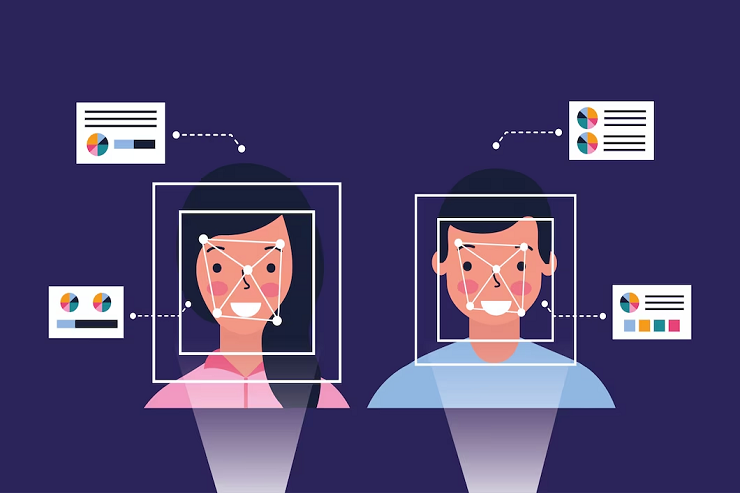
Facial recognition technology has a staggering amount of potential in various industries. However, before its most complex applications can be realized, a few flaws frequently creep into its functionality, and a few ethical issues must be addressed. We could not have predicted a few decades ago that facial recognition would eventually become a nearly indispensable aspect of our lives. Technology is now deeply ingrained in our daily lives, from unlocking your smartphone to making a digital transaction for an online (or offline) purchase.
Facial recognition systems extensively use computer vision and machine learning in AI. They operate as follows: To recreate a person’s face within the system, trained algorithms identify the distinguishing features in their face, such as the number of pixels that can fit between their eyes or the curve of their lips. Then, a wide variety of looks kept in the system database are compared to this recreation. The system “recognizes” the pursuit and completes the user’s task if the algorithms determine that it matches a face in the database mathematically.
In addition to completing this task in nanoseconds, today’s facial recognition technology can work effectively in low-quality lighting, low-image resolution, and low-angle views. While being used for various purposes, facial recognition systems, like other AI-powered technologies, must adhere to a few ethical principles.
The use of facial recognition technology raises several ethical questions and implications.
1. Data Handling Safety
The data gathered from various sources, such as the cameras in streets, banks, and shopping centers, is stored on low-security servers, providing less data protection. These biometric data are readily accessible to hackers, who may use them dishonestly. The facial recognition system, stored on various local servers, lacks adequate security and IT support.

2. Face Recognition Technology Is Inaccurate
Even though face recognition technology has advanced significantly, some tests and studies reveal that it still has flaws that prevent it from correctly identifying the faces of children, the elderly, and people with darker skin tones. According to tests, this technology detects the faces of people with lighter skin tones with more than 90% accuracy, but there is a significant error in seeing people with darker skin tones.
3. Finance Face Recognition Accuracy Problems
The accuracy of this technology has come under scrutiny because of its new use in shopping, purchases, and other activities. Facial recognition technology’s inability to more accurately identify people, as in money transfer apps, could lead to significant financial losses. Even minor flaws in the engineering of the facial recognition device could significantly impact financial applications. As a result, when developing, testing, and implementing recognition systems, engineers have an ethical duty to consider the accuracy of the facial recognition algorithm.
4. Problems With Data Storage For Criminal Detection
The police or a relevant agency keeps a list of those who have reason to suspect criminal activity. Their facial information is saved and used to identify criminals and keep records. The agency in charge of the suspect’s arrest will keep his information even if he is innocent and subsequently freed. In the circumstances like this, using facial recognition technology raises significant ethical and privacy concerns.

5. Issues with Face Recognition Accuracy in Healthcare
In the healthcare industry, facial recognition is used for several purposes, including monitoring blood pressure, diagnosing illnesses, and determining pain levels. The accuracy of this technology is a significant concern because it is also used for treatment, diagnosis, and other medical procedures. Ethical questions exist when this technology is used in healthcare because research has shown significant errors and inaccuracy. Any diagnosis made with the slightest error could seriously harm the patient’s health. Therefore, when using this technology to treat and diagnose patients, medical professionals must use caution.
6. Face Recognition Risks For Personal Information
People have used face detectors on cell phones, laptops, and desktop computers for many years. Personal data and information stored on PCs, laptops, and cell phones have led to several risks to data privacy. Due to shortcomings in face recognition technology, identical twins and people with similar facial features can easily access a person’s information. As a result, unauthorized access to data stored on a computer or smartphone is possible.
Wrapping Up
Biometric technology that uses facial recognition is gaining popularity in criminal detection and public safety fields. Several ethical issues are brought up by this technology, though, including the lack of individual consent, data storage issues, hacking risks, accuracy issues, and personal data risks. These issues must be addressed to ensure that the advantages of facial recognition technology are maximized while the risks are minimized.
The creation and application of this technology must consider ethical issues, such as AI ethics. If the difficulties and ethical concerns are appropriately addressed, facial recognition and artificial intelligence technology have many applications and offer significant benefits.
